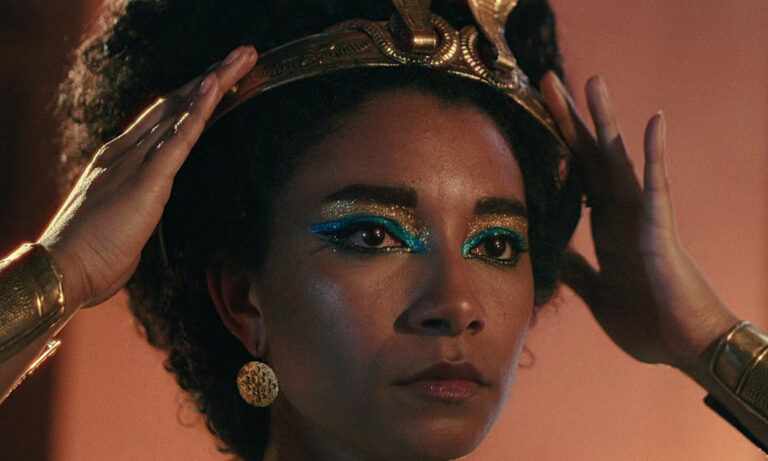Netflix’s depiction of Queen Cleopatra as Black enrages Egyptian scholars and racists alike

It has taken major streaming platforms—and the media landscape at large—far too long to prioritise telling stories which feature POC protagonists. And, in so many ways, there is still such a long way to go. With this important shift has also come a lot of new and crucial societal discussions regarding the ways in which projects can accurately ensure diverse representation.
African Queens—a Netflix docu-series narrated and produced by renowned actor, Will Smith’s wife Jada Pinkett Smith—has been one such project subject to a number of nuanced and layered debates and controversies. The series, which has already released its first season about Queen Njinga of Angola, tells the stories of important powerful African women of history.
Pinkett Smith explained at a Netflix fan event: “We don’t often get to see or hear stories about Black queens… the sad part is that we don’t have ready access to these historical women who were so powerful and were the backbones of African nations.”
While an objectively necessary and empowering show, the Netflix series has received some valid criticisms regarding its casting choices. In the first season, the actor cast to play Queen Njinga was British-Nigerian Adesuwa Oni. Understandably, some Angolans did take issue with the fact that not only was the season filmed in South Africa, but both of the major protagonists weren’t native to the country.
Season two of the show will cover the story of Queen Cleopatra, an Egyptian royal. And with so much discourse already surrounding season one, it’s no surprise that there’s been a magnifying glass on the episodes set to follow.
According to The Independent, Cleopatra will be portrayed by biracial British actor Adele James. The casting has allegedly sparked debate in Egypt, with some locals disputing the fact that Cleopatra wasn’t actually Black in real life. Due to there being so little information regarding the Egyptian Queen’s racial identity, much of the conversation has been based on a handful of academics’ supposed findings.
A number of historians have assessed that Cleopatra was most likely Greek, and therefore would have been light-skinned. In fact, one lawyer has even filed a complaint demanding that the public prosecutor take “the necessary legal measures” and block access to Netflix’s services in Egypt.
Opinions online have been definitely mixed. A number of young Egyptians have stated their umbrage with the casting decision. One user named Mars posted an extensive Twitter thread discussing the show, dissecting Cleopatra’s heritage and imploring people not to watch the show, writing: “It’s very hurtful as an Egyptian to see your culture and identity being stripped away from you.”
Journalist and historian David Abulafia wrote an opinion piece in The Spectator, stating: “Although the name of Cleopatra’s mother is unknown, there are good grounds for insisting that she was not of Egyptian descent. Cleopatra’s Greekness was expressed in her daily speech.”
On the other hand, in the African Queens docu-series, historian academic Sally Ann Ashton has been quoted noting: “Given that Cleopatra represents herself as an Egyptian, it seems strange to insist on depicting her as wholly European.”
The expert went on to conclude, “Cleopatra ruled in Egypt long before the Arab settlement in North Africa. If the maternal side of her family were Indigenous women, they would’ve been African, and this should be reflected in contemporary representations of Cleopatra.”
It’s also incredibly important to recognise the fact that there have been numerous examples of shows whitewashing historical figures and moments in time, and there’s been barely a peep of criticism in those instances. However, when the actress in question is a Black woman and there’s some potential historical disparity at play, everyone seems to have a critique to share.
It should also be pointed out that a number of the opinions shared online inaccurately focus on the idea of ‘Afrocentrics’ now dominating mainstream media, an idea that’s not only false but also clearly charged with colourism and racism.
James herself has responded to the criticisms, posting on her Twitter: “If you don’t like the casting don’t watch the show. Or do and engage in (expert) opinions different to yours. Either way, I’m gassed and will continue to be!”
The new season of African Queens is due to land on Netflix on 10 May 2023. Until that time comes, it’s likely that academics and netizens alike will continue to question the genetic makeup of Queen Cleopatra. And while discourse and debate is inevitable and often encouraged, it also shouldn’t be an excuse to spread hate and harm.





